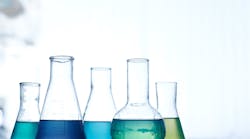shironosov/iStock/Thinkstock
Whether you work with corrosive chemicals directly or are just around them, knowing the dangers and how to protect yourself from them is important. Why? Because these chemicals can damage your eyes, skin, and lungs.
You might be surprised how many chemicals turn out to be corrosive. Cleaning solvents are, by definition, corrosive. Their corrosiveness is what allows them to clean. They aren’t like soap, which cleans by lifting or lubricating rather than dissolving or corroding.
The two main types of corrosive chemicals are:
- Acids. These produce pain as they burn you. That sounds bad, but at least you know something is wrong. Of course, if a strong acid gets in your eyes the damage may be permanent before you can effectively respond.
- Bases. These attack silently. There’s no pain to tell you something is wrong. You might notice an odd smell (your own skin burning), only to look down in horror at a nasty hole burning its way into your arm or leg. Obviously, you want to prevent contact with bases.
Sponsored Recommendations
Sponsored Recommendations



